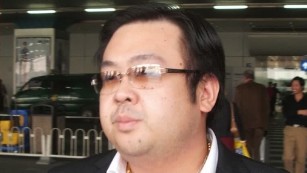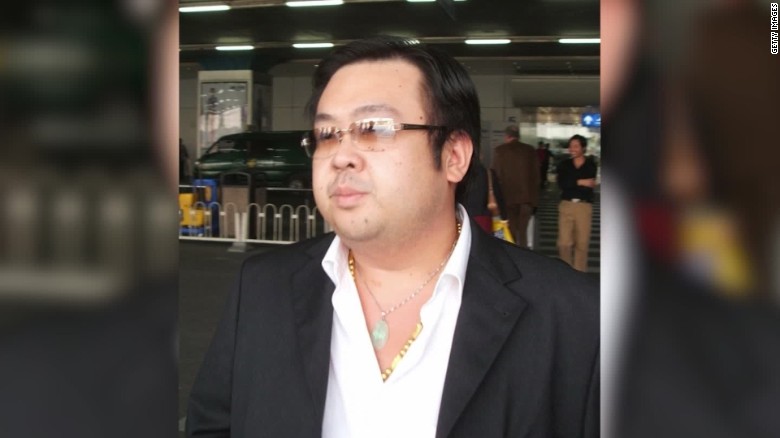Suspect in Kim Jong Nam death thought she used baby oil, official says
A suspect in the death of Kim Jong Nam, the estranged half brother of North Korean dictator Kim Jong Un, thought she was rubbing baby oil on his face, according to an Indonesian official.
The suspect is one of two women who Malaysian authorities believe swiped the face of Kim Jong Nam with the VX nerve agent that led to his death while he was waiting to catch a flight February 13 at Kuala Lumpur International Airport.
Indonesian authorities were able to meet with suspect Siti Aishah, an Indonesian citizen, for the first time Saturday.
Death of North Korea's Kim Jong Nam: A timeline of intrigue
Aishah thought the substance she rubbed on Kim's face was "a kind of oil, baby oil, something like that," said Andreano Erwin, Indonesia's deputy ambassador to Malaysia.

Kim Jong Nam
But Malaysian police said Friday that tests on Kim's eyes and face revealed the presence of the VX nerve agent. VX is an internationally banned substance that can kill within minutes.
After the women wiped Kim's face with the liquid, he started feeling dizzy and died shortly afterward on his way to the hospital, Malaysian police said.
Erwin said Aishah told Indonesian authorities she was asked to do these "activities" by people who "looked like Japanese or Koreans." The deputy ambassador also said Aishah was given 400 Malaysian ringgits (about $90) for her role.
The woman earlier told investigators she thought she was participating in a television prank show when she squirted liquid in Kim's face, Indonesian police said.
Malaysian police Inspector-General Khalid Abu Bakar shot down the prank story, saying the women were "trained to swab the deceased's face."
Speaking to reporters, a Malaysian official said Aishah vomited in a taxi shortly after the incident, but denied reports she was showing any symptoms of VX contamination.
More suspects sought
Malaysian police have said Aishah and a Vietnamese woman named Doan Thi Huong acted at the instruction of four North Koreans, but North Korea vehemently denies any involvement in Kim's death.
Vietnamese officials met with Doan on Saturday, according to state-run news agency Viet Nam News. Embassy officials told the agency that Doan was in good health and thought she was participating in a prank show.
Malaysian authorities have asked Interpol to put out an alert for the four North Koreans. Malaysian police have said the four suspects are thought to be back in Pyongyang.
Three other North Koreans are wanted for questioning by Malaysian police, including Hyon Kwang Song, second secretary at the North Korean Embassy in Malaysia, and Kim Uk Il, a staff member of North Korea's state-owned Air Koryo.
Both are believed to still be in Malaysia.
Police in Kuala Lumpur carried out a raid on a private apartment there Thursday, Selangor State police Chief Abdul Samah Mat said. The raid was related to the investigation into Kim's death. Police are analyzing samples they collected from the apartment, he said.
In addition to the two women detained, North Korean man Ri Jong Chol is also in custody.
Aishah's boyfriend, Muhammad Farid Bin Jalaluddin, was taken in for questioning and released on bond.
No sickness reported at airport
No one at the Kuala Lumpur airport has become sick from exposure to the VX nerve agent that investigators believe was used in Kim's killing, airport officials said Saturday.
"No anomalies on the medical cases" have been reported at an airport clinic, and the staff member who attended to Kim before his death "is in good health," according to Malaysia Airports Holdings Berhad, which manages the airport.
Police say the airport is free of contamination of any hazardous materials.
At a news conference early Sunday, the Selangor police chief said the airport was declared a "safe zone" following an airport sweep conducted by the Royal Malaysia Police Forensics along with Fire and Rescue forensics and the Atomic Energy Licensing Board.
The three agencies tested specific airport areas where Kim circulated for VX nerve agent.
Abdul Samah said the tests took more than an hour and were conducted early Sunday, around 1 a.m. local time, in order to avoid creating "unnecessary alarm" among passengers.
The chief also said the airport is not busy at that time, which made it easier to conduct the screening process.
News Courtesy: www.cnn.com











